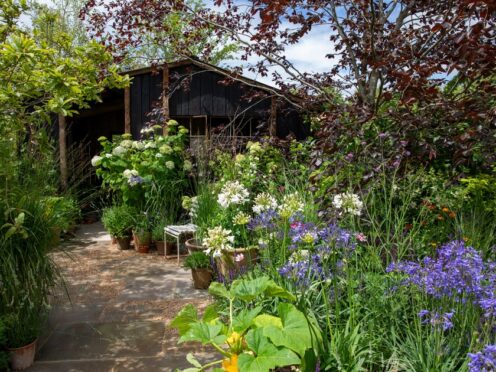Gardeners who help wildlife and the environment gain a greater boost to wellbeing than those who use weedkillers, pesticides and peat compost, research suggests.
The research from the Royal Horticultural Society (RHS) has been launched at the start of the charity’s Hampton Court Palace Garden Festival, which features exhibits that focus on peat-free gardening and how gardeners can save money and the planet at the same time.
A study by RHS scientists, published in the journal Urban Forestry and Urban Greening, found that taking a more sustainable approach – from letting your grass grow long to avoiding pesticides and peat compost and providing areas for wildlife – can make people feel better than more conventional gardening.
The RHS asked more than 2,000 people about their gardening habits, and found that 83% of those who gardened considered it positive for their overall health and wellbeing, with the strongest benefit for mental health.
Meet the 2024 #RHSHampton Court Master Growers, Tynings Climbers, a nursery specialising in climbers and passion flowers run by Jane Lindsay and Toni O'Connor 🏆
Find out more Tynings Climbers as well as Jane's top tips for growing passion flowers: https://t.co/nu23ozESlA pic.twitter.com/D2HT3Ryiqb
— The RHS (@The_RHS) June 27, 2024
The research revealed that those who said they actively supported wildlife, or limited their environmental impact, through activities such as avoiding pesticides, planting flowers for bees and watering with rainwater, felt higher overall health and wellbeing benefits from gardening.
The team behind the research pointed to mental and physical benefits of a greener approach, such as hand weeding and digging over compost using more energy than applying weedkiller and buying compost products.
The RHS also suggested sustainable gardening provides more opportunity for reflection and restoration through more connection through nature and a less stressful experience from working with rather than against wildlife.
Lead report author and RHS sustainability fellow Chloe Sutcliffe said: “It makes sense that making more sustainable choices is likely to benefit our wellbeing in the longer term.
“But it seems that doing so can directly benefit our wellbeing in the here and now too, something that policy makers and health professionals might tap into in order to deliver improved climate, biodiversity and human health outcomes.”

RHS Hampton Court Palace Garden Festival includes gardens for the charity which focus on peat-free growing, with information highlighting the damage that peat harvesting can do the climate and natural world, and featuring more than 2,000 plants grown without peat.
The plants in the display which shifts from naturalistic planting echoing a natural peatland to a domestic back garden, include herbs, vegetables and even houseplants to show the variety of things that can be grown using sustainable resources.
Another RHS garden is the Money Saving Garden, designed by Anya Lautenbach who shares her gardening tips on social media as “the garden fairy”.
Ms Lautenbach said that she wanted to highlight “by saving money you also save the planet”.
“I just wanted people to come here and think, ‘oh my god, I can do it,” she said.
She said the garden featured plants that could all be propagated from seed, which was more environmentally friendly as it used fewer pots, less transport, less packaging materials, and greater self sufficiency.
Her other top tips for money saving gardening include seeking out second hand gardening equipment and furniture outside of the peak season, asking around proactively for items such as pots, making compost and using cut branches for stakes.
But she said she wanted to support the industry, adding that if people were still gardening, they would buy other things.
“The high cost of living crisis will make people think they can’t afford gardens, I’m coming and saying you can still garden.
“Gardening is so good for your mental health, so long term you will have a healthier society,” she added.
Other environmentally-focused gardens at the Hampton Court Palace include the Moonshadow moth garden which supports moths – the “unsung nocturnal heroes of pollination” – a rain garden, a compact “food forest” and the Garden of Renewal, which focuses on biodiversity and sustainability.
